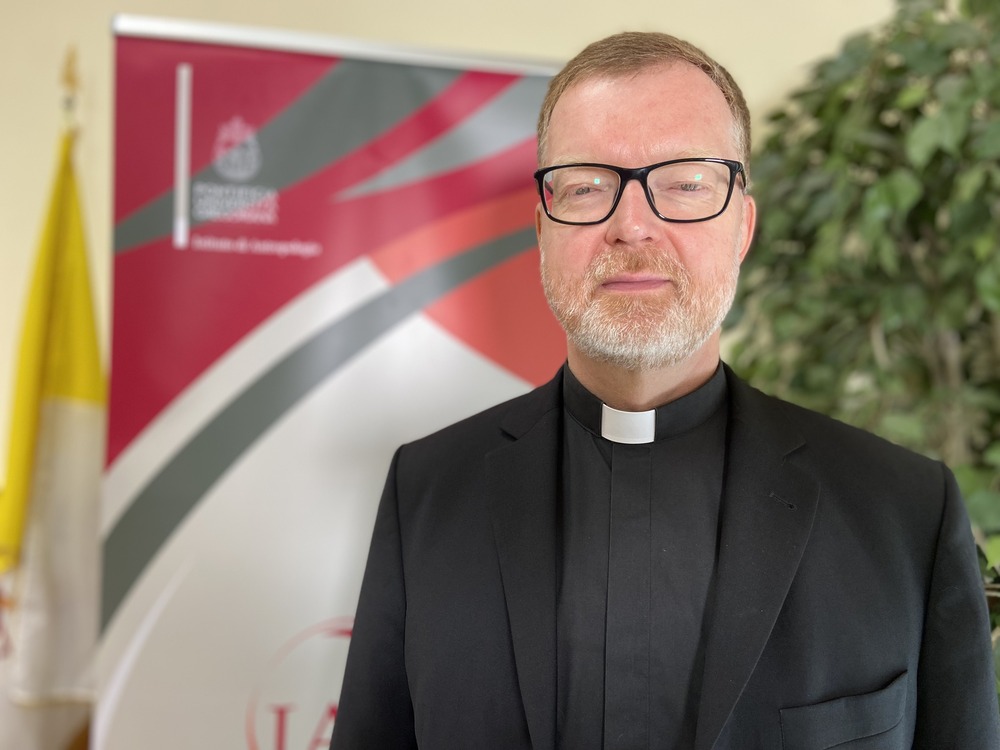
Jesuit Father Hans Zollner, president of the Pontifical Gregorian University's Institute of Anthropology's Interdisciplinary Studies on Human Dignity and Care, poses for a photo during a safeguarding conference held at the university in Rome June 18, 2024. (CNS/Justin McLellan)
Jesuit Father Hans Zollner — the founder and director of the Institute of Anthropology at the Pontifical Gregorian University and a former member of the Pontifical Commission for the Protection of Minors — joined several safeguarding experts in releasing a joint proposal in Rome Nov. 18 advocating a change in church law on the handling of sexual abuse cases.
Specifically, the proposal — co-written by members of the institute and the Seattle-based Ending Clergy Abuse human rights organization — called for a global extension of the U.S. Conference of Catholic Bishops' protocol of permanently removing from ministry credibly accused priests or deacons.
That norm, established in 2002 alongside the USCCB's "Charter for the Protection of Children and Young People" with the Vatican's permission, at present only applies to the Catholic Church in the U.S.
In a Dec. 3 email to OSV News, Zollner shared his insights regarding the challenges of making universal zero tolerance a reality for the worldwide Catholic Church.
OSV News: What specific obstacles in the Catholic Church exist to make the U.S.-led zero tolerance a global norm?
Zollner: The provision, which is part of the USCCB's norms approved by the Holy See, has been recognized as being an effective means of preventing further abuse. The Catholic Church is a unity in which real systemic change cannot come about by geographically or otherwise separate measures.
Regarding the global church, we have a number of other issues that need to be addressed as well: How does the church apply such a principle (to) different systems of jurisdiction and juridical practice? The common law system of the U.S. is foreign to most countries in this world. Americans are shocked to learn that the publication of the full name of a sex offender is, according to public law, punishable in the EU and other parts of the world.
Moreover, (how) do we consider abuse perpetrated by lay men and women?
Finally, the church authorities in the future need to publish their case law so that we know why some accused are dismissed from the clerical state, some are removed from pastoral ministry, some are acquitted. I hear from many bishops and provincials that they want to know not only the verdicts, but also their juridical motivation.
Advertisement
OSV News: How can those obstacles be overcome?
Zollner: What is needed is on the one hand reliable, reasonable, and sustainable work on all relevant areas of concern. On the other hand, change of attitude and change of mentality come about only through persistent efforts to educate and convince people, primarily those who are (of good will).
In my experience, around the globe there are more and more Catholics at all levels of church life and of church authority who are willing to engage and to act according to what the Gospel asks us to do.
OSV News: If canon law is reformed to include zero tolerance, are you hopeful the canon will actually be implemented on the ground? Or is there a possibility that reluctant dioceses will sidestep it?
Zollner: Surely, implementation is the big concern.
What is needed is, first, the willingness and the instruments for oversight and enforcement. We have the necessary rules, but they are not applied in a consistent and transparent way.
Secondly, guidance, monitoring, support, and encouragement is needed for effective implementation on the ground, especially when it comes to largely open questions like what can be done for those who are dismissed — when there is no church oversight at all — and for those who are removed from ministry? Who is supervising, sanctioning, accompanying the latter ones?






